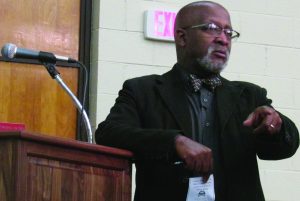
By Cory A. Thompson – [email protected] – Staff Writer
At a UNC Asheville campus discussion on police violence, students and faculty began organizing a new community-involved advocacy group in response to the recent police shooting of 19-year-old Asheville local A.J. Marion.
“(The) Asheville Police Department will try to wait out the community’s interest in this case,” said Dwight Mullen, a political science professor at UNCA who spoke at the event. “We can’t let this issue die.”
Sam Tyson, the forum’s main student-organizer, said he witnessed the events surrounding the killing from his apartment window last month.
“I woke up to the police officer yelling, ‘If I see you, I’m going to shoot you,’” said Tyson, a junior political science student. “We ran from our window into the hallway, and there we heard the gunshot ring out. People in my apartment missed seeing the final second of A.J.’s life by just a second.”
On the morning of the shooting, Tyson made a Facebook post describing the event as an instance of humans hunting humans. Within the week, he began planning the campus discussion, which approximately 35 people attended, including representatives from SGA. Tyson provided his eyewitness report to the gathering while Mullen put the shooting in context and suggested action steps for interested students.
“I would coordinate our goals with those of the media,” Mullen said. “I think our main goal should be pushing for releasing the official report.”
According to Mullen, the local police turn the case over to the State Bureau of Investigation in the event of a police shooting. Mullen said these prolonged investigations leave the community and family without important details for uncomfortably long.
“The media has changed the report at least three different times,” Mullen said. “In the first story, he was shot in self-defense. In the second story, the paper reported that he was not armed. The official reports would answer a lot of questions.”
SGA Sens. Matt Turpin and Rachel Collman collected contact information from students interested in forming a student advocacy group.
“We’ll be contacting the people from the meeting soon in conjunction with other student groups and councils, black student association, professors and other leadership groups,” Sen. Collman said.
Mullen said he would provide the contact information of local African-American community leaders to those organizing the student task force. He said he predicts the actions of concerned UNCA students would surprise and reassure the community.
“UNC Asheville has a very bad reputation in the African-American community, and efforts like these would go a long way in restoring our reputation,” Mullen said. “Students have energies and attentions that the community is completely unaware we have.”
Life stresses often make it difficult for members of the African-American community to advocate for themselves, Mullen said.
“Often people are holding down jobs or have no job, and very serious stresses at home prevent them from organizing,” Mullen said. “These people don’t have time to organize. Combining your talents with theirs is a better way to go. You’ll often find that people can’t extend themselves to confront the police about a killing like this.”
Mullen teaches courses in the political science department and oversees undergraduate research projects focusing on the State of Black Asheville. Since he arrived in Asheville, Mullen said he made the health and safety the African-American community his personal and professional concern.
“Asheville is one of three cities in N.C. in the last month that has experienced the police shooting of an African-American man,” Mullen said. “The community responded to the first two shootings by having a meeting with police. They didn’t know their conversation would precede a local police shooting by a week.”
According to the research conducted by Mullen’s State of Black Asheville class, the police search black male drivers in Asheville four times as often as white females. The police search black male drivers 20 percent of the time, twice as much as their white male counterparts.
“People walk into my office, and they ask me if this is open season on the black man,” Mullen said. “They’re not joking.”
According to Mullen, the personal advice he gives his fellow African-Americans prioritizes safety over justice.
“I tell them, you walk the straight and narrow, as messed up and unjustified as that may be,” Mullen said. “I find myself telling people not to wear a hoodie. I tell them to listen to every order when they’re stopped by the police. Civil rights don’t have jack to do with it.”


![Brooke Pedersen [second from the right] and Luis Reyes [right] hold banners during the Wrap The Woods event.](https://thebluebanner.net/wp-content/uploads/2025/09/ELIZABETH_PRITCHITT_IMG_3470-1200x804.jpg)















